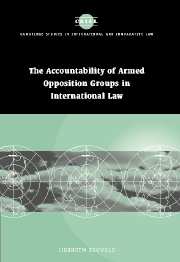Book contents
- Frontmatter
- Contents
- Table of treaties and declarations
- Table of cases
- Table of other documents
- List of abbreviations
- Introduction
- PART 1 THE NORMATIVE GAP
- PART 2 THE ACCOUNTABILITY GAP
- 3 Accountability of group leaders
- 4 Accountability of armed opposition groups as such
- 5 Accountability of the state for acts of armed opposition groups
- 6 The quest for accountability
- Conclusion
- Bibliography
- Index
- CAMBRIDGE STUDIES IN INTERNATIONAL AND COMPARATIVE LAW
5 - Accountability of the state for acts of armed opposition groups
Published online by Cambridge University Press: 28 July 2009
- Frontmatter
- Contents
- Table of treaties and declarations
- Table of cases
- Table of other documents
- List of abbreviations
- Introduction
- PART 1 THE NORMATIVE GAP
- PART 2 THE ACCOUNTABILITY GAP
- 3 Accountability of group leaders
- 4 Accountability of armed opposition groups as such
- 5 Accountability of the state for acts of armed opposition groups
- 6 The quest for accountability
- Conclusion
- Bibliography
- Index
- CAMBRIDGE STUDIES IN INTERNATIONAL AND COMPARATIVE LAW
Summary
In its current form, international law is unable to make armed opposition groups themselves fully accountable for their abuses against the civilian population. It is, therefore, legitimate to question whether the traditional roads of international law can fill the accountability gap. Indeed, the conclusions drawn in the previous chapter validate the quest for the accountability of the territorial state for failure to prevent or repress acts of armed opposition groups. Its supreme authority over all persons and things within its territory and its ensuing status as the primary subject of international law justify the decision to extend the quest for accountability to the state. This choice is also warranted by the fact that international bodies consider primarily the conduct of the state.
A survey of international practice shows that the state's accountability may arise when armed opposition groups are fighting each other, with the established government making no effort to shield the civilian population from the effects of the hostilities. Moreover, state accountability may exist when the government armed forces fight armed opposition groups with the sole aim of defeating them militarily, at the cost of putting civilians at risk, whether from the government or from the armed opposition groups. Attacks on civilians by opposition groups may even further the government's aim of defeating these groups by bringing them into disrepute with the civilian population, in the hope that the population will then side with the government.
- Type
- Chapter
- Information
- Accountability of Armed Opposition Groups in International Law , pp. 164 - 219Publisher: Cambridge University PressPrint publication year: 2002



